Life Sciences News
See our Latest Journal Publications
Identified: A mechanism that protects plant fertility from stress
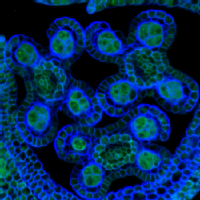 As temperatures rise due to global warming the need to protect plants from stressful conditions has increased, as stress can cause a loss in yield and cause further impact economically. A consortium led by Professor Jose Gutierrez-Marcos have successfully identified two proteins that protect crops from stress, which is key in safeguarding food production.
As temperatures rise due to global warming the need to protect plants from stressful conditions has increased, as stress can cause a loss in yield and cause further impact economically. A consortium led by Professor Jose Gutierrez-Marcos have successfully identified two proteins that protect crops from stress, which is key in safeguarding food production.
Press Release (1 March 2021)
New research finds no evidence that schools are playing a significant role in driving spread of the Covid-19 virus in the community
New research by epidemiologist Dr Mike Tildesley and colleagues has found that there is no significant evidence that schools are playing a significant role in driving the spread of the Covid-19 disease in the community, particularly in primary schools. However, careful continued monitoring may be required as schools re-open to stay well informed about the effect they have upon community incidence.
Press Release (15 February 2021)
Women in science, innovate in science
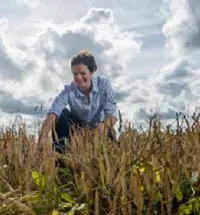 To celebrate International Day of Women and Girls in Science on 11 February 2021, young researchers at Warwick, including PhD student Rosanne Maguire, were asked about their hopes for their research and the importance of equality in their chosen field.
To celebrate International Day of Women and Girls in Science on 11 February 2021, young researchers at Warwick, including PhD student Rosanne Maguire, were asked about their hopes for their research and the importance of equality in their chosen field.
Article (11 February 2021)
University of Warwick signs agreement with agronomy specialist to bring UK beans to market
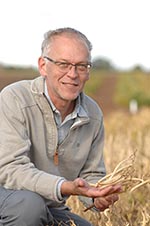 The University of Warwick’s research commercialisation wing, Warwick Innovations, has signed a contract with agronomy specialist Agrii to promote the commercial production of UK haricot beans developed by Professor Eric Holub from Warwick’s Crop Centre, part of the School of Life Sciences. Professor Holub has bred three haricot bean varieties which are adapted for growing in the UK climate and are more suited to standard farm machinery.
The University of Warwick’s research commercialisation wing, Warwick Innovations, has signed a contract with agronomy specialist Agrii to promote the commercial production of UK haricot beans developed by Professor Eric Holub from Warwick’s Crop Centre, part of the School of Life Sciences. Professor Holub has bred three haricot bean varieties which are adapted for growing in the UK climate and are more suited to standard farm machinery.
“Self-sufficiency in food production is important for reducing human impact on global climate. British-grown beans can help us shift our diets to a healthier future, adding to other UK ingredients to supply the growing trend of flexitarian diets with new markets like Brit-Mediterranean and Brex-Mexican style food.” Professor Holub.
Press Release (9 February 2021)
Soil bacteria hormone discovery provides fertile ground for new antibiotics
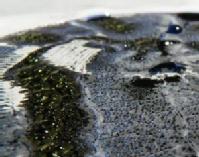 Research by Dr Chris Corre and colleagues could lead to improved manufacturing of existing antibiotics, and open up opportunities to discover new ones.
Research by Dr Chris Corre and colleagues could lead to improved manufacturing of existing antibiotics, and open up opportunities to discover new ones.
Press Release (3 Feb 2021)
How do plants from the past protect plants of the future?
The UK Vegetable Gene Bank, on our Wellesbourne campus, is celebrating 40 years of vital work, making sure the plants we all rely on for a healthy diet have a future.
Watch a recent short BBC video on the Gene Bank.
Future Leader to Watch – Fabrizio Alberti
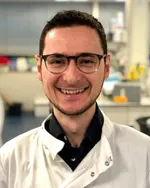 Future Leader to Watch is a series of interviews with the first authors of a selection of Reviews published in Biology Open, helping early-career researchers promote themselves alongside their papers. Dr Fabrizio Alberti is first author on ‘Recent developments of tools for genome and metabolome studies in basidiomycete fungi and their application to natural product research’, published in BiO.
Future Leader to Watch is a series of interviews with the first authors of a selection of Reviews published in Biology Open, helping early-career researchers promote themselves alongside their papers. Dr Fabrizio Alberti is first author on ‘Recent developments of tools for genome and metabolome studies in basidiomycete fungi and their application to natural product research’, published in BiO.
Read the interview
New centre puts farmer priorities at heart of innovation research
Warwick has joined forces with the University of Reading, Royal Agricultural University, Harper Adams University and Newcastle University to focus agricultural research where it can make most difference on the ground. The new Centre for Effective Innovation in Agriculture (CEIA) will see the universities work together to address the gap between scientific research on innovation and real-life farming experience. The centre will focus on how research and development investment can best support innovation to be adopted by farmers.
Press Release (5 December 2020)
Chemical memory in plants affects chances of offspring survival
Professor Jose Gutierrez-Marcos and an international team of researchers have uncovered the mechanism that allows plants to pass on their ‘memories’ to offspring, which results in growth and developmental defects.
Press Release (1 December 2020)
Warwick scientists design model to predict cellular drug targets against Covid-19
A computational model of a human lung cell has been used to understand how SARS-CoV-2 draws on human host cell metabolism to reproduce by Dr Hadrien Delattre and Professor Orkun Soyer. This study helps understand how the virus uses the host to survive, and enable drug predictions for treating the virus to be made.
Press Release (25 November 2020)
Diabetic drug could slow the progression of Parkinson’s disease
A hallmark of Parkinson's disease is the degeneration of a group of neurons in the brain that release the neurotransmitter dopamine (dopaminergic neurons). By introducing low concentrations of structurally-defined aggregates of alpha synuclein, a key toxic species in Parkinson’s disease, into single dopaminergic neurons, Emily Hill and Dr Mark Wall have shown these protein aggregates open a specific channel in the cell membrane, reducing neuronal excitability.
Press Release (24 November 2020)
Breakthrough in studying the enzyme that ultimately produces fish odour syndrome
Fish odour syndrome (trimethylaminuria) is a debilitating disease, in which the liver cannot break down the smelly chemical trimethylamine which is produced by enzymes from bacteria residing in the gut leaving people with a fish like odour. Dr Mussa Quareshy and colleagues are paving the way to prevent the syndrome after a breakthrough in studying the enzyme in the gut which produces trimethylamine.
Press Release (23 November 2020)
Understanding lung infections in patients with cystic fibrosis
For young people with cystic fibrosis, lung infection with Staphylococcus aureus, MRSA, is common and is treated with antibiotics in the hope that this will prevent a decline in lung function. However there has recently been debate over the role S. aureus plays in CF lung disease. Dr Esther Sweeney, Dr Freya Harrison and colleagues have used a new model of CF lungs which could be used to make better decisions about future use of antibiotics.
Press Release (19 November 2020)
Chemical clues in leaves can reveal ash tree resistance to deadly disease
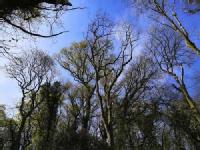 Dr John Sidda, Professor Murray Grant and colleagues, have identified a group of chemicals present in ash leaves which could be used as biomarkers to look for susceptibility or resistance to ADB.
Dr John Sidda, Professor Murray Grant and colleagues, have identified a group of chemicals present in ash leaves which could be used as biomarkers to look for susceptibility or resistance to ADB.
Press Release (11 November 2020)
Could insect manure help grow crops? Warwick and Durham researchers to investigate
The waste from larvae production could be used as a crop fertiliser should commercial insect farms get off the ground in the UK. This is the concept that Rob Lillywhite and researchers at Durham University are investigating as part of a major government-funded project to look at the viability of rearing insects for animal feed in the UK.
Press Release (26 October 2020)
Scientists develop genetic ‘monitors’ that detect when genes are active
New genetic sensors, developed by Professor Alfonso Jaramillo and colleagues, could function as a lab test device and even as a live monitoring system inside living cells.
Press Release (26 October 2020)
SLS student is BBC Gardeners World Magazine Gardens of the Year finalist
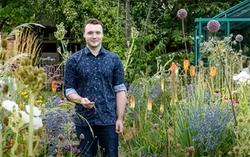 Andy Gladman, a PhD student with Dr Dave Chandler, is a finalist in the BBC Gardeners World Magazine Gardens of the Year competition. His ornamental allotment in Leamington is one of eight gardens in the People’s Choice Award 2020.
Andy Gladman, a PhD student with Dr Dave Chandler, is a finalist in the BBC Gardeners World Magazine Gardens of the Year competition. His ornamental allotment in Leamington is one of eight gardens in the People’s Choice Award 2020.
Find out more, watch the video and take the opportunity to cast your vote at https://www.surveymonkey.co.uk/r/2RZXD78
Voting closes at noon on Tuesday 27 October 2020.
Precautionary Breaks: planned, limited duration circuit breaks to control the prevalence of COVID-19
Cases of COVID-19 are rising exponentially in almost all regions of the country, with some areas experiencing extremely high levels of infection - new research involving University of Warwick researchers has found. Against this backdrop of rising cases, their paper examines the impact of a short 2-week period of intense control.
Press Release (14 October 2020)
1st International BioDesign Research Conference
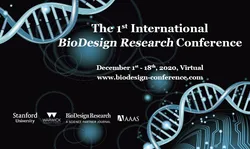 Organised by Professor Alfonso Jaramillo and colleagues, the 1st International BioDesign Research Conference will be held 1-18 December 2020 via Zoom. The conference will showcase the latest achievements and research progress in the field of Biosystems Design and Synthetic Biology.
Organised by Professor Alfonso Jaramillo and colleagues, the 1st International BioDesign Research Conference will be held 1-18 December 2020 via Zoom. The conference will showcase the latest achievements and research progress in the field of Biosystems Design and Synthetic Biology.
Find out more and register.
2020 Nobel Prize in Chemistry: Warwick scientists explain Crispr-Cas9
This week, it was reported that the 2020 Nobel Prize in Chemistry has been awarded to Emmanuelle Charpentier and Jennifer Doudna for their work on the technology of genome editing - more specifically, Crispr-Cas9. Scientists in the School of Life sciences who also research Crispr-Cas9 explain what it is, and discuss its significance in our lives.
Expert comment (8 October 2020)
